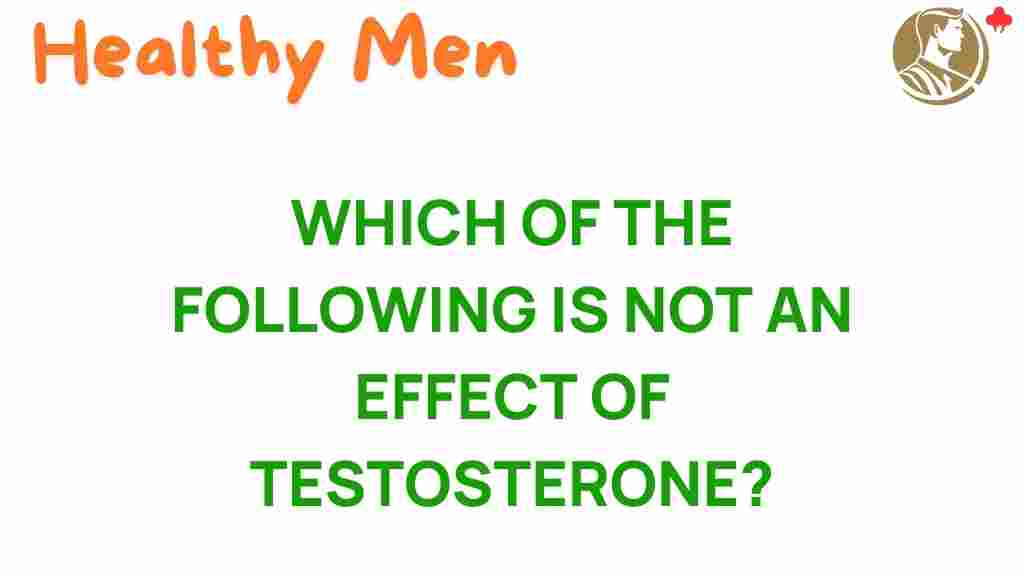Unraveling the Myths: What Testosterone Really Does to Your Body
Testosterone, often referred to as the male hormone, plays a crucial role in various physiological processes in both men and women. Despite its importance, there are numerous myths surrounding testosterone and its effects on the body. This article aims to debunk these myths and provide a clearer understanding of what testosterone really does, its effects on health, body composition, mood regulation, and its role in hormone therapy for male health and wellness.
The Role of Testosterone in the Body
Testosterone is a steroid hormone produced primarily in the testes in men and in the ovaries and adrenal glands in women. It is essential for several bodily functions, including:
- Development of male reproductive tissues: Testosterone is critical for the development of the prostate and testes.
- Muscle and bone health: It contributes to muscle mass and bone density.
- Fat distribution: Testosterone influences body fat distribution and metabolism.
- Mood and cognition: It plays a role in regulating mood, cognition, and energy levels.
Effects of Testosterone on Body Composition
One of the most discussed effects of testosterone is its influence on body composition. Here’s how testosterone impacts physical characteristics:
- Increased Muscle Mass: Testosterone promotes muscle protein synthesis, leading to increased muscle size and strength. This is why many fitness enthusiasts consider testosterone levels when planning their fitness routines.
- Decreased Body Fat: Higher testosterone levels are associated with lower body fat percentages, as testosterone enhances fat metabolism.
- Bone Density: Testosterone helps in maintaining bone density. Low levels can lead to osteoporosis, especially in older men.
Mood Regulation and Mental Health
Testosterone is not just a physical hormone; it also affects mental well-being. Here are some effects of testosterone on mood:
- Improved Mood: Adequate testosterone levels are linked to higher energy levels and overall mood enhancement.
- Reduction in Depression: Low testosterone can contribute to feelings of depression and fatigue. Studies have shown that testosterone therapy can improve mood in men with low levels.
- Cognitive Function: Testosterone has been associated with improved cognitive abilities, including memory and concentration.
Common Health Myths About Testosterone
Despite the benefits of testosterone, many myths persist. Here are some common misconceptions:
- Myth 1: Testosterone is only for men. While testosterone is often referred to as a male hormone, women also produce it, and it plays a vital role in their health.
- Myth 2: Higher testosterone always means better health. Excessively high testosterone levels can lead to health issues, including aggression and increased risk of cardiovascular disease.
- Myth 3: Testosterone therapy is only for older men. Hormone therapy can benefit younger men with clinically low testosterone levels, improving their quality of life.
Understanding Hormone Therapy
Hormone therapy, particularly testosterone replacement therapy (TRT), is a common treatment for men with low testosterone levels. Here are some key points to understand:
- Indications for Therapy: TRT is typically recommended for men with symptoms such as low libido, fatigue, depression, and reduced muscle mass.
- Forms of Therapy: Testosterone can be administered via injections, patches, gels, or pellets.
- Monitoring Requirements: Regular monitoring is essential to ensure testosterone levels remain within a safe range and to track any potential side effects.
Fitness and Testosterone
Many athletes and fitness enthusiasts seek to understand the relationship between testosterone and fitness. Here’s what you should know:
- Testosterone and Strength Training: Higher testosterone levels can enhance the effects of strength training, leading to better results in muscle gain and fat loss.
- Natural Ways to Boost Testosterone: Regular exercise, particularly weightlifting and high-intensity interval training, can naturally elevate testosterone levels.
- Importance of Recovery: Adequate rest and recovery are essential for maintaining healthy testosterone levels, as overtraining can lead to decreased levels.
Potential Risks of Testosterone Use
While testosterone can provide benefits, it is important to be aware of potential risks associated with its misuse:
- Cardiovascular Risks: Some studies have linked testosterone therapy to an increased risk of heart attacks and strokes.
- Hormonal Imbalance: Excessive testosterone can lead to hormonal imbalances, resulting in side effects such as acne, hair loss, and mood swings.
- Dependency and Abuse: There is a risk of dependency on testosterone, particularly among athletes seeking performance enhancement.
How to Determine If You Need Testosterone Therapy
If you suspect low testosterone levels, consider the following steps:
- Consult a Healthcare Professional: Schedule an appointment with a doctor who specializes in hormone health.
- Get Tested: A simple blood test can measure your testosterone levels.
- Discuss Symptoms: Be open about any symptoms you’re experiencing to help your doctor make an informed decision.
- Evaluate Treatment Options: If low testosterone is confirmed, discuss the benefits and risks of testosterone therapy with your healthcare provider.
Conclusion
In conclusion, testosterone plays a vital role in overall health, body composition, and mood regulation. While it’s essential for male health and wellness, many myths surrounding testosterone can lead to misunderstandings about its effects. By unraveling these myths and understanding the true effects of testosterone, individuals can make informed decisions regarding their health, fitness, and potential hormone therapy.
For more information on hormone health, visit this resource. If you have further questions about testosterone and its effects, consider speaking with a healthcare professional.
Remember, maintaining a healthy lifestyle through balanced nutrition, regular exercise, and adequate rest can naturally support your testosterone levels. Embrace wellness by being proactive about your health!
This article is in the category Conditions and created by healthymen Team
